Detroit Red Wings: Top 5 Worst Contracts in Team History

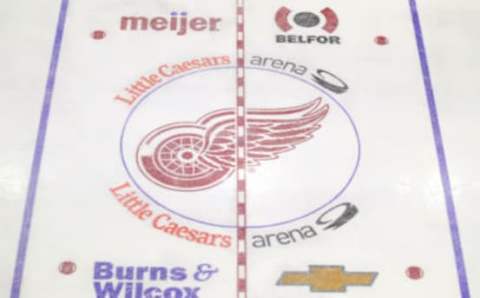
When one thinks of the Detroit Red Wings what does one think of? Loyalty? Championships? Longevity? Those three are certainly credible but how about money spent, as in contracts? Year after year, every single roster in the NHL changes due to trades, free-agent signings, and retirements. For the Red Wings, the organization has brought in players that have not been only loyal but have been a mainstay with the franchise.
The Detroit Red Wings, like any other organization, have signed free agents to better their team and have an upgraded chance at the Stanley Cup. However, like other teams, the contracts signed do not always work out. Those players are then traded, not re-signed, or are playing fewer minutes due to less production. The Detroit Red Wings have signed some amazing talent who have helped them achieve greatness at the end of the season. But what about those that did not work out?
The Top 5 Worst Contracts In Detroit Red Wings History
The five players listed below were brought in as a free-agent or re-signed because of the previous season’s production. Some of these players are Hall of Famers and have won Stanley Cups, and others were depth pieces that did not work out. This happens in hockey, not all signings bring the outcome that was expected, so they part ways and hope for a better outcome.
The Detroit Red Wings are careful who they bring in because of their loyalty and dedication to players who will make a difference. The players on this list have had success at one point or another, getting the attention of Red WIng’s management. Two forwards, two defensemen, and a goaltender represent the five worst contracts in franchise history. These five players have performed above expectations somewhere but for some reason did not work out in the Red Wings system. The five below are all good, established, and experienced players in their own right.
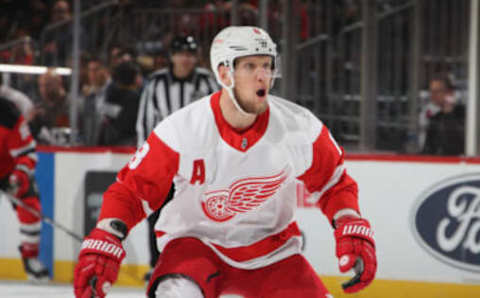
Justin Abdelkader was drafted in the second round (42nd overall) in the 2005 NHL Draft. He was a secondary scoring option who played the game with an edge. Early in his career, he struggled, trying to find his game at the NHL level. Over time, he adjusted and became a well-rounded, good player. His career-high in points came during the 2014-15 season when he scored 23 goals and 21 assists for 44 points. For his offensive production, he was awarded a new contract. That contract was signed on November 12, 2015, and that was a seven-year deal worth $29.725 million.
Fans could not understand why the contract was even offered due to the fact that his career high was half a point per game. Fans became enraged at the contract, feeling Abdelkader had not earned the contract over one good season. At that time, this was a lot of money for a player who played primarily on the third line for most of his Detroit Red Wings career. Abdelkader did not play much of a role on special teams, focusing more on the regular shift most nights.
Fans, and management, would soon realize that this contract was too much money based on his offensive production after it was signed. He scored 120 points in five seasons after the deal was signed. After general manager Steve Yzerman took over the reins, Abdelkader was told he was no longer needed and was bought out. He has since played parts of the past three seasons overseas with little to no success.
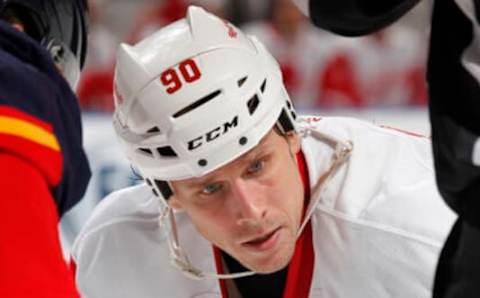
Forward Stephen Weiss came to Detroit before the start of the 2013-14 season as the best player ever to suit up for the Florida Panthers, becoming the franchise leader in most offensive categories. Weiss signed as a free agent with the Detroit Red Wings on July 5, 2013, to a five-year contract worth $24.5 million. The contract came with a no-movement and no-trade clause, which meant he was the Red Wing’s property for the next five years. Or so it seemed.
During his stay with Detroit, he was not the player he was in Florida. He played mostly on the second or third line and seemed lost on more than one occasion. He was paired with offensive players but could not get himself going. In his two seasons with the Detroit Red Wings, he scored a total of 11 goals and 18 assists for 29 points in 78 games, or about a point every three games. Weiss was brought in to anchor the second line and provide some offense and secondary scoring, something he was not used to as he was the star and first-line center in Florida. Playing time became an issue, along with the lack of offense, so he spent time with the Red Wings AHL affiliate, the Grand Rapids Griffins. He played in three games, totaling two goals.
This would be the last contract Weiss would ever sign as he has not played in the NHL, or anywhere else, since then. Weiss was a cheaper option over Valterri Filppula but was not as productive and was eventually bought out. He would find his way out of the top 12 and look for answers.
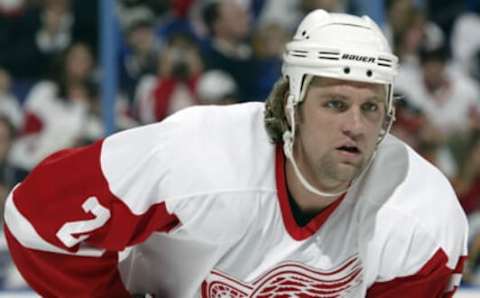
Defenseman Derian Hatcher was a man among the boys with the Dallas Stars. He was a brick wall in front of the net, clearing the puck and punishing forwards who dare enter the crease. A first-round pick (eighth overall) in the 1990 NHL Draft by the Minnesota North Stars, Hatcher came into the league bringing fear with his 6-foot-5 and 235-pound frame. He was nasty in the defensive zone, fighting and playing a physical style of defense that had not been seen much before.
The defensive side of the puck was his and his only. He would fight the biggest players in the league with no fear. Hatcher, unlike his offensively gifted brother Kevin Hatcher, was a monster on skates and the opposition knew that. In his career, he amassed 1,581 penalty minutes in his 16-year career. Although he did have 331 points his success came from playing a mean, physical style of hockey. At the time, the Detroit Red Wings needed size and toughness on the back end so it seemed like a perfect fit. On July 3, 2003, he signed a free-agent deal with the Detroit Red Wings. His deal was for five years and #30 million and the deal made sense of what he brought to the table and what the Detroit Red Wings needed.
After the third game of the season, he suffered a knee injury that sidelined him for most of the season. He played just 15 games that season. The Red Wings bought out his contract after the 2004-05 season was lost to a lockout. Hatcher never played for them again but did end up signing a deal with the Philadelphia Flyers.
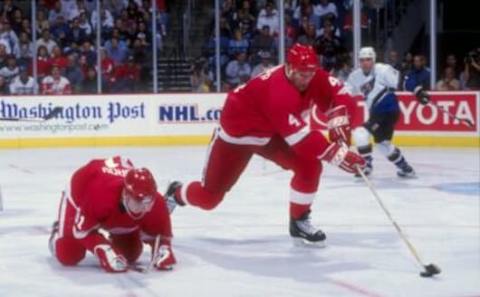
Defenseman Uwe Krupp signed a free-agent deal with the Detroit Red Wings on July 7, 1998. The deal was a four-year deal worth $16.4 million, only two years after winning the Stanley Cup with the Colorado Avalanche. The 6-foot-6 and 235-pound defenseman from Germany would win a Stanley Cup with Detroit in the 2002 season, but he did not play a factor. His experience and size, just like Hatcher, is what caught the eye of Red Wings management.
However, it did not take long for the first contract to be a major bust. Before Christmas, Krupp suffered a back injury but not before he played a reasonable 22 games. This would start to be the end for Krupp as he was found dogsledding two weeks after the injury. This led to a battle between Krupp and the Red Wings as Detroit tried to void his contract but Krupp countered with a grievance. After a two-year battle, Krupp rejoined the Detroit Red Wings, only playing a few games. While he was on the Red Wings roster when they won the Cup in 2002 Krupp did not see his name engraved due to the fact he only played a limited amount of games.
Krupp would return to the NHL, this time with the Atlanta Thrashers in 2002-03. He would only play four games before his career came to an end. If it were not for the injuries Krupp could have been a major factor in the Detroit Red Wings blueline. His size and experience could have been a big factor in the success of the Red Wings but, unlike other big contracts, this was due to injuries and not poor performance.
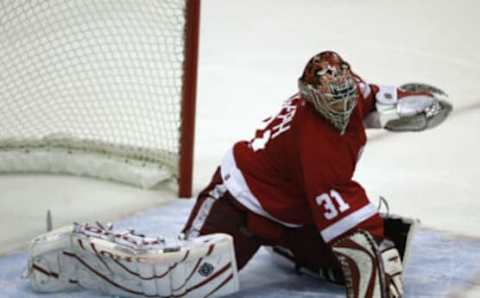
Goaltender Curtis Joseph had a Hall of Fame-type career with the St. Louis Blues. He was consistent and played every game like his last. His energy and dedication let him play his style between the pipes, and this was the reason he was one of the best in the 1990s. Few were better than CuJo during this time as he was outstanding. Over his 19-year career, he secured 454 wins in between the pipes, placing him amongst the league’s best goaltenders.
On July 2, 2002, Joseph signed a 3-year, $24 million deal with the Detroit Red Wings after many successful seasons with the St. Louis Blues, Toronto Maple Leafs, and Edmonton Oilers. Although he had aged a bit, expectations were high based on his past success. That coupled with the retirement of goaltender Dominik Hasek the Red Wings thought they had found his replacement.
During his two-year stint with the Red Wings, Joseph had a record of 50-29-9 with a .911 save percentage and a goals-against average of 2.43. Those are above-average numbers, all things considered. However, the playoffs spelled doom for Joseph and this led to his divorce from the Red Wings. He played 13 playoff games with a 4-8 record, but a .931 save percentage and a 1.64 goals-against average.
The Red Wings’ offense simply disappeared in the playoffs, often leaving Jospeh out to dry. His stay in Detroit lasted two years, as he signed a contract to play in Phoenix with the Coyotes on August 17, 2005. Joseph played well during his Red Wings career but in the end, management thought it would be best to move on and start fresh. Joseph ultimately retired from pro hockey on January 12, 2010 after a long, successful NHL career.